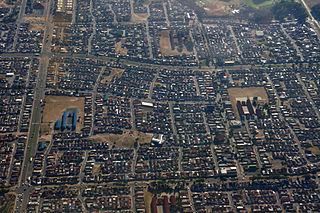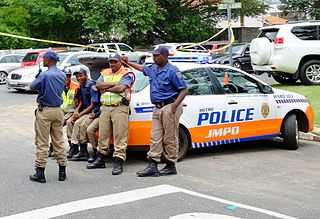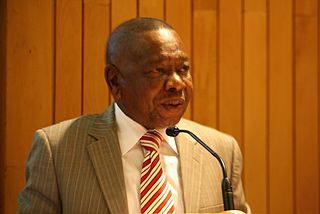
Soweto is a township of the City of Johannesburg Metropolitan Municipality in Gauteng, South Africa, bordering the city's mining belt in the south. Its name is an English syllabic abbreviation for South Western Townships. Formerly a separate municipality, it is now incorporated in the City of Johannesburg Metropolitan Municipality, Suburbs of Johannesburg.

South African Airways (SAA) is the flag carrier airline of South Africa. Its headquarters are in Airways Park on the grounds of O. R. Tambo International Airport in Kempton Park, Ekurhuleni, Gauteng. In partnership with SA Express, SA Airlink and its low-cost carrier, Mango, the airline flies to 56 destinations in South Africa, continental Africa and around the world from its Johannesburg hub, using a fleet of 47 aircraft. Vuyani Jarana has been CEO since November 2017.
In the United Kingdom, passenger transport executives (PTEs) are local government bodies which are responsible for public transport within large urban areas. They are accountable to bodies called integrated transport authorities (ITAs), or where they have been formed, to combined authorities. The PTEs joined together to form the Passenger Transport Executive Group (PTEG) of which Strathclyde Partnership for Transport and Transport for London were both associate members. In 2016 it became the Urban Transport Group.

Rail Corporation New South Wales (RailCorp) is an agency of the State of New South Wales, Australia established under the Transport Administration Act 1988 in 2004. It is currently a division under the control of Transport for NSW. It holds rail property assets, rolling stock and rail infrastructure in the Sydney metropolitan area and limited country locations in the state and it makes these assets available to Sydney Trains and NSW TrainLink for their operations. It also manages the NSW Government’s contract with the Airport Link Company. The chief executive of RailCorp is Sydney Trains chief executive Howard Collins.

Apartheid was a system of institutionalised racial segregation that existed in South Africa from 1948 until the early 1990s. Apartheid was characterised by an authoritarian political culture based on baasskap, which encouraged state repression of Black African, Coloured, and Asian South Africans for the benefit of the nation's minority white population. The economic legacy and social effects of apartheid continue to the present day.

Air Transport Command (ATC) was a United States Air Force unit that was created during World War II as the strategic airlift component of the United States Army Air Forces.

Transnet SOC Ltd is a large South African rail, port and pipeline company, headquartered in the Carlton Centre in Johannesburg. It was formed as a limited company on 1 April 1990. A majority of the company's stock is owned by the Department of Public Enterprises, or DPE, of the South African government. The company was formed by restructuring into business units the operations of South African Railways and Harbours and other existing operations and products.

Mitchells Plain is a suburb about 32 km (20 mi) from the city of Cape Town. It is one of South Africa's largest suburbs. It is located on the Cape Flats on the False Bay coast between Muizenberg and Khayelitsha. Conceived of as a "model suburb" by the apartheid government, it was built during the 1970s to provide housing for Coloured victims of forced removal due to the implementation of the Group Areas Act. The suburb was reportedly named after Mitchell Baker but this is unconfirmed, and is one of a number of possible explanations.
The nine provinces of South Africa are divided into 52 districts, which are either metropolitan or district municipalities. They are the second level of administrative division, below the provinces and above the local municipalities.

The term taxi war is usually used to refer to the turf wars fought between taxi associations and individual minibus taxi drivers in South Africa from the late 1980s onwards. These taxi wars were reported to still be ongoing in 2006.

Law enforcement in South Africa is primarily the responsibility of the South African Police Service (SAPS), South Africa's national police force. SAPS is responsible for investigating crime and security throughout the country. The "national police force is crucial for the safety of South Africa's citizens" and was established in accordance with the provisions of Section 205 of the Constitution of South Africa.
The Conscientious Objector Support Group (COSG), a support group to conscientious objectors (COs) in South Africa, was formed in 1978. The organisation grew in the context of South African resistance to war, at the time of Apartheid. COs at the time included those who openly refused to report to the Military, once conscripted, those who were sometimes referred to as draft dodgers, and in due course those who were doing statutory community service.

The establishment of the 'Q' Services Corps as part of the South African Permanent Force was promulgated in the Government Gazette dated 10 November 1939.

Bhekokwakhe "Bheki" Hamilton Cele is the South African Minister of the Police, since 26 February 2018 and was the National Commissioner of the South African Police Service until October 2011, when he was suspended from duty, due to allegations of corruption. He was appointed to this position in July 2009, replacing Jackie Selebi, who was suspended in January 2008 following charges of corruption. Previously he held the post of Member of the Executive Council (MEC) for Transport, Safety and Security in KwaZulu-Natal. He is a member of the African National Congress.

The South African National Roads Agency SOC Ltd or SANRAL is a South African parastatal responsible for the management, maintenance and development of South Africa's proclaimed National Road network which includes many National ("N") and some Provincial ("R") route segments.

Transport for NSW, sometimes abbreviated to TfNSW, and pronounced as Transport for New South Wales, is a statutory authority of the New South Wales Government that was created on 1 November 2011 to manage the transport services in the state of New South Wales, Australia. It is the leading transport agency of the state. The authority is a separate entity from the New South Wales Department of Transport, the ultimate parent entity of Transport for NSW

The South African Maritime Safety Authority (SAMSA) is a South African government agency established on 1 April 1998 as a result of the 1998 South African Maritime Safety Authority Act 5. as such it is responsible for the implementation of current International & National Regulations regarding the Maritime Industry as well as upon all recreational marine vessels within its jurisdiction.

The Natal Railway 4-4-0T Perseverance of 1876 was a South African steam locomotive from the pre-Union era in the Colony of Natal.
The South African Congress of Trade Unions was established in 1955 after the right wing unions walked out of the South African Trades and Labour Council in 1954 to form the exclusive White, Coloured, and Indian workers’ Trade Union Council of South Africa.















